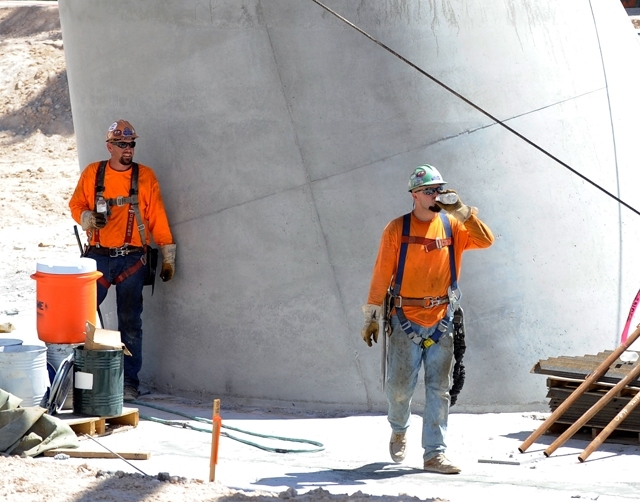Caesars Entertainment not a Wall Street superstar

Wall Street still isn’t sold on the efforts by Caesars Entertainment Corp. to get out from under more than $20 billion of long-term debt.
Caesars, which operates 10 casinos on or near the Strip, reported a 2.9 percent decline in net revenue for the first quarter earlier this month. But what troubles the analyst community was a net loss of $217.6 million, or $1.74 per share.
How the company, which has more than 50 casinos across the U.S. including four in Atlantic City, can service its debt, is the pressing concern.
“The Caesars story remains relatively the same in our eyes,” Macquarie Securities gaming analyst Chad Beynon told investors recently. “Fundamentals continue to be soft in most of its markets and the significant debt load continues to be an overhang on the company.”
RBC Capital Markets gaming analyst John Kempf said Caesars has sufficient liquidity and avenues to secure additional cash to manage the company’s debt, at least until 2015.
At that point, Kempf told investors that Caesars will need to have undertaken a “contentious” debt-for-equity or distressed debt exchange.
“In general, nothing has changed from our point of view following the company’s first-quarter release,” Kempf said. “Our negative view is predicated on the company’s unsustainable capital structure and diminishing liquidity profile.”
So, what is Caesars to do?
Company Chairman Gary Loveman thinks the key for Caesars, in addition to cost containment initiatives, is to capitalize on the gaming industry’s growth opportunities.
Caesars is spending more than $1 billion on capital expenditures this year, including $550 million to open The Linq on the Strip, which includes a remodeling of the former Imperial Palace into The Quad. Also, the company is spending $180 million to transform Bill’s Gamblin’ Hall into Gansevoort Las Vegas.
Outside of the Strip, Caesars and its joint venture partner Rock Gaming of Detroit opened two casinos and a racetrack casino in Ohio and are building a casino in Baltimore. Caesars and the Suffolk Downs Race Track are seeking permission from Massachusetts to build a hotel-casino in Boston.
Caesars hopes to create cash flow streams from the developments. In Ohio, the company’s Horseshoe casinos in Cincinnati and Cleveland, along with the Thistledowns Race Track, are operating. The Linq, which includes retail, dining and entertainment attractions — including the 550-foot-tall High Roller Observation Wheel — will open by the end of the year.
Deutsche Bank gaming analyst Carlo Santarelli resumed coverage of Caesars this month after an extended restriction was lifted. He said there are still “several aspects” of the Caesars story that he finds “compelling.”
He termed the company’s expansion into Ohio and Baltimore as “low risk-high reward development opportunities.”
Also, Caesars expects to launch its World Series of Poker branded pay-to-play online gambling website in Nevada after the annual tournament opens for play at the Rio this week.
Santarelli said Caesars would be in “a leading position” if Internet poker is ever legalized nationally.
Still, he boosted his view of Caesars’s stock price from $6 a share to $14 a share. In recent weeks, Caesars has been trading from $15 to $16 a share on Nasdaq Global Select.
“Given our view of risks (debt levels, deferred spend, development execution and competition), we see shares fairly valued at present,” Santarelli said.
Last month, Caesars said it would spin off Caesars Interactive, which owns the World Series of Poker, and several casinos, including Planet Hollywood, into a separate company.
The assets would be owned by Caesars, stockholders, and private equity firms Apollo Management and TPG Capital, which would invest $500 million cash into Caesars Entertainment.
In a report to investors, GimmeCredit Investors Service analyst Kimberly Noland said the spin-off didn’t prevent the company’s credit rating from being downgraded by another agency. She said Caesars has “agility in accomplishing financial maneuvers.’
However, Noland said it didn’t appear that “significant cash proceeds” would flow to the operating company.
“While we don’t see a liquidity crisis near-term given the company’s current cash and availability, pressures could increase as the parent company faces maturity of near $5 billion of securities in 2015,” Noland said.












